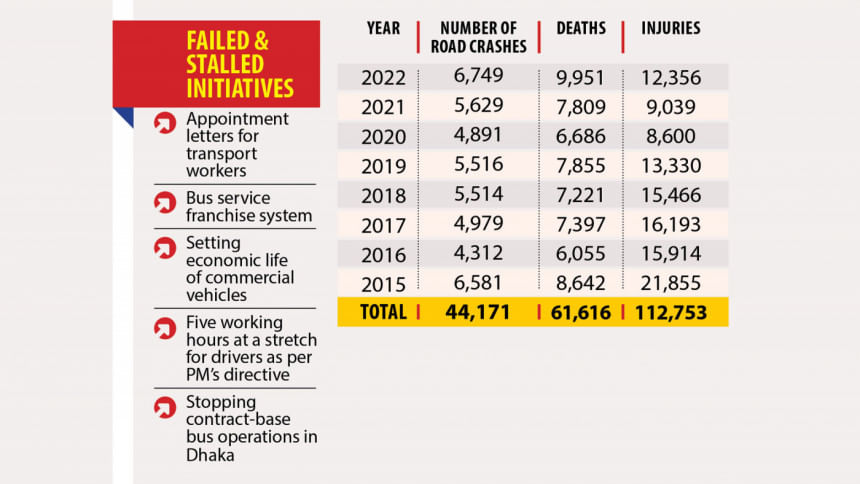National Road Safety Day: Transport leaders still the stumbling block

Transport associations, mostly led by ruling party leaders, continue to work as the main obstacle in bringing discipline in the road transport sector, leaving thousands of people to die in road crashes every year.
Powerful leaders, who represent all government bodies in the road transport sector, not only influence the government's decisions in their favour but also force the authority to change their decisions taken to improve road safety.
The associations refuse to formalise the transport workers by giving them appointment letters, halt implementation decisions and even laws, and enforce wildcat strikes holding people hostage if any decision or step goes against them.
In so doing, they make road safety a far cry.
Against the backdrop, the country is set to observe the National Road Safety Day today.
This year, at least 14 people were killed and 22 injured every day, according to Bangladesh Road Transport Authority data, which is much lower than Bangladesh Jatri Kalyan Samity's estimate.
In the last eight years, 61,616 people were killed and 1.12 lakh injured in 44,171 road crashes, according to the Bangladesh Jatri Kalyan Samity.
This means, more than 21 people were killed and 39 injured a day between 2015 and 2022.

Although the government has set "Let move on the streets following rules and build a smart Bangladesh" as the slogan of this year, emphasising on following traffic rules, the Road Transport Act 2018 is not being implemented fully.
"The authorities are failing to play the due role because of the influence of transport associations. In many cases, the government cannot implement its decisions because of their opposition," said Mozammel Hoque Chowdhury, secretary general of Jatri Kalyan Samity.
Referring to the involvement of top transport leaders in all transport-related forums including the National Road Safety Council, Road Transport Advisory Council and a taskforce, he said: "They have become partners of the government to a large extent."
Instead of consulting with experts, the government often makes decisions by talking to transport leaders.
"This does not yield the expected results."
If the government goes for implementing a decision that goes against the associations' interests, they will obstruct it, Chowdhury added.
Most recently, the government backtracked from setting the economic life of commercial vehicles to reduce road crashes and pollution.
Following the recommendation of a high-powered committee led by Shahjahan Khan, president of the Bangladesh Road Transport Workers Federation and an Awami League presidium member, the government in May announced that it has capped the life of buses at 20 years and trucks and lorries at 25.
Mashiur Rahman Ranga and Khandaker Enayet Ullah, the president and secretary general of the Bangladesh Road Transport Owners Association respectively, and Osman Ali, general secretary of the Federation, were members of the committee.
Ranga is a Jatiya lawmaker and former state minister of an AL-led government, while Enayet is a vice president of Dhaka South AL. Ali is a leader of the Bangladesher Samajtantrik Dal.
But, the government in August backtracked from the move amid pressure from the transport associations.
In Dhaka city, the private buses operate on a "trip basis" -- a system where bus owners receive a certain amount of money for each trip from the drivers, who often engage in unhealthy competition to pick up more passengers, causing road crashes and traffic congestion, experts said.
After the unprecedented road safety movement in 2018, transport owners vowed to end the system. But the system still rules bus services in Dhaka city.
On the other hand, the government's move to rationalise the bus routes in the city and adjacent areas and bring all public buses under a fixed number of companies for better regulation saw little progress allegedly due to the non-cooperation of the transport leaders.
Since December 2021, the authority could launch "Nagar Paribhan" in only three of the 42 proposed routes under the "single company, single-route" formula.
In June 2018, Prime Minister Sheikh Hasina instructed keeping reserve drivers on long-route vehicles and restricting them to a maximum of five hours behind the steering at a stretch.
This was not implemented by the transport associations on the pretext of not having enough drivers.
As per the law, giving appointment letters to transport workers is a must, and since October 2019 a task force led by the home minister directed transport leaders to ensure the matter on several occasions.
But this directive remains unfulfilled.
Contacted, Ranga outright rejected the allegation that the transport associations are the main obstacle in bringing discipline in the road transport sector.
"The authorities are failing to play the due role because of the influence of transport associations, which, in many cases, stops the government from implementing its decisions."
"Many believe that we hold people hostage [to serve our interest], which is not correct," he told The Daily Star yesterday.
Execution of the law will not be possible unless the nasimons and karimons, which are rampant on highways, are banned.
Asked about the non-issuance of appointment letters, he said: "We have started giving appointment letters and I myself give appointment letters to my workers. If [the Federation] can provide us with specific examples, we will take action in this regard."
Contacted, The Federation's Ali blamed the owners' associations for not giving appointment letters to the transport workers. "They say one thing but do something else."
Asked about pressuring the government along with the transport owners' associations, he said the alliance between the association of transport owners and workers broke down in 2016 and they were not ready to take any blame for the owners' associations.

 For all latest news, follow The Daily Star's Google News channel.
For all latest news, follow The Daily Star's Google News channel. 




Comments